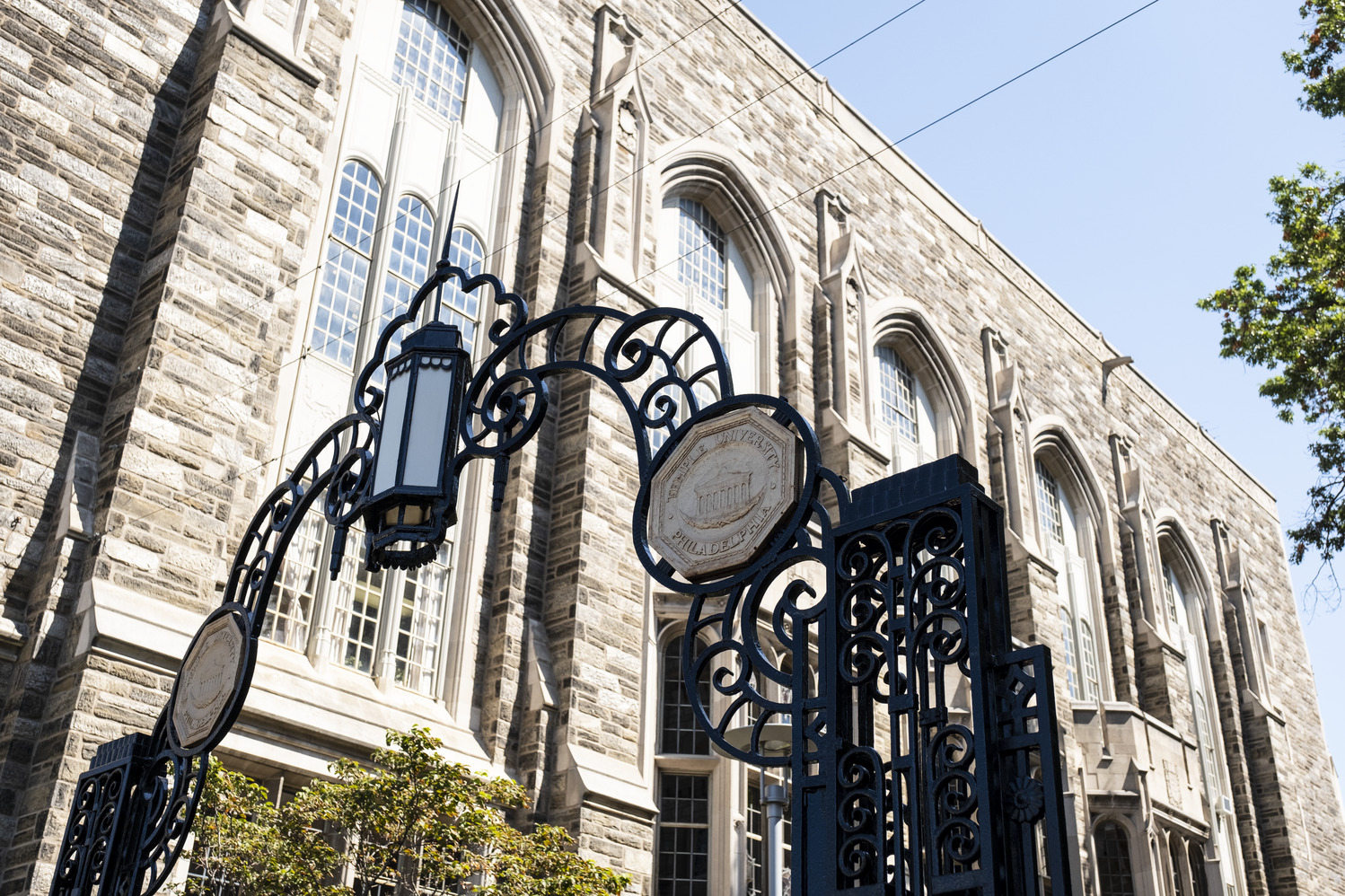
2023 Laura H. Carnell Chair Workshop The Last Colony: A Tale of Exile, Justice and Britain’s Colonial Legacy
Presented by the Institute for International Law and Public Policy and Laura H. Carnell Chair
April 18, 2023
about the event
On Tuesday, April 18, 2023, Temple Law School will host an event exploring Philippe Sands’s recent monograph The Last Colony: A Tale of Exile, Justice and Britain’s Colonial Legacy. The book explores the international legal implications of the forcible removal of the population of the Chagos Islands, the Indian Ocean archipelago from which, in 1973 by the British colonial administration. Sands is a Professor of Law at University College London, and a practicing barrister who has been involved in many international cases, including proceedings at the International Court of Justice addressing the wrongs done to the Chagossians.
This invitation-only event is sponsored by Temple University Beasley School of Law, the Laura H. Carnell Chair, and the Law School’s Institute of International Law and Public Policy.
About the Author
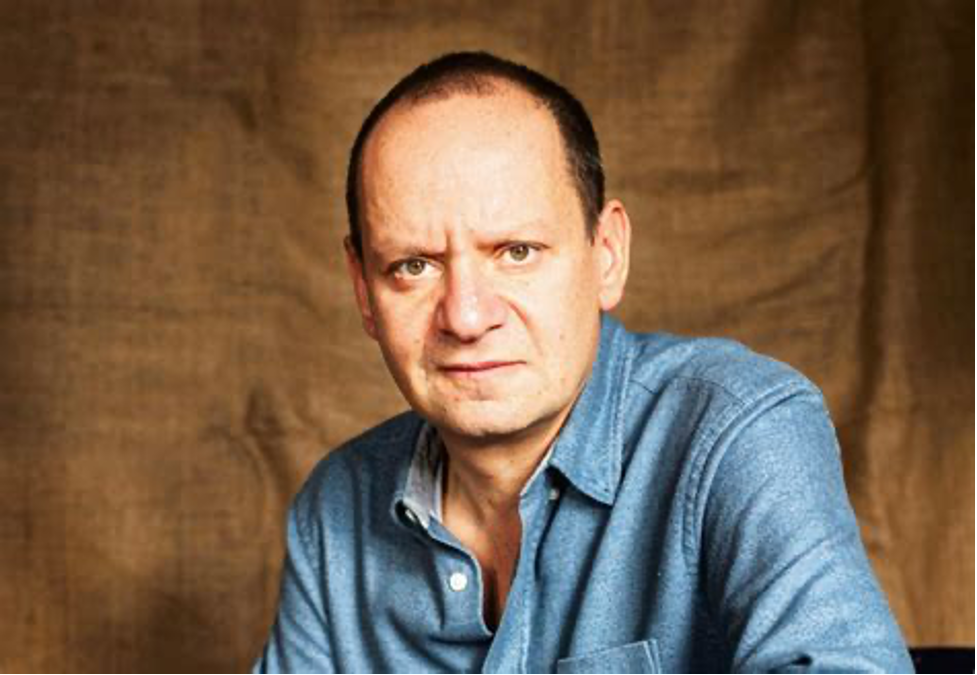
Philippe Sands
Professor of the Public Understanding of Law, Faculty of Laws, University College London. He is President of English PEN and serves on the board of the Hay Festival of Arts and Literature.
His books include East West Street (2016) and The Ratline (2020). Sands is a regular commentator on the BBC and CNN and writes frequently for leading newspapers. In recent years he has been a Visiting Professor at the University of Toronto (2005), the University of Melbourne (2005) and the Universite de Paris I (Sorbonne) (2006, 2007). He has previously held academic positions at the University of London’s School of Oriental and African Studies, Kings College London and , University of Cambridge and was a Global Professor of Law at New York University from 1995-2003. He was co-founder of FIELD (Foundation for International Environmental Law and Development), and established the programmes on Climate Change and Sustainable Development. He is a member of the Advisory Boards of the European Journal of International Law and Review of European Community and International Environmental Law (Blackwell Press). In 2007 he served as a judge for the Guardian First Book Prize award.
As a practicing barrister he has extensive experience litigating cases before the International Court of Justice, the International Tribunal for the Law of the Sea, the International Center for the Settlement of Investment Disputes, and the European Court of Justice. He frequently advises governments, international organisations, NGOs and the private sector on aspects of international law. In 2003 he was appointed a Queen’s Counsel. He has been appointed to lists of arbitrators maintained by ICSID and the PCA.
Participants
To view participant papers, click here.
Diane Marie Amann
 Diane Marie Amann is Regents’ Professor of International Law and holds the Emily & Ernest Woodruff Chair in International Law at the University of Georgia School of Law. She has served since mid-2017 as a Faculty Co-Director of the Dean Rusk International Law Center, a position she took up after completing a term as Associate Dean for International Programs & Strategic Initiatives. Amann’s research addresses issues related to international criminal justice, human and child rights, constitutional law, and security governance. Recent work examines roles played by women professionals at the post-World War II international trials, and legal regimes designed to prevent and punish international crimes against and affecting children. From December 2012 to June 2021, she served as ICC Prosecutor Fatou Bensouda’s Special Adviser on Children in & affected by Armed Conflict.
Diane Marie Amann is Regents’ Professor of International Law and holds the Emily & Ernest Woodruff Chair in International Law at the University of Georgia School of Law. She has served since mid-2017 as a Faculty Co-Director of the Dean Rusk International Law Center, a position she took up after completing a term as Associate Dean for International Programs & Strategic Initiatives. Amann’s research addresses issues related to international criminal justice, human and child rights, constitutional law, and security governance. Recent work examines roles played by women professionals at the post-World War II international trials, and legal regimes designed to prevent and punish international crimes against and affecting children. From December 2012 to June 2021, she served as ICC Prosecutor Fatou Bensouda’s Special Adviser on Children in & affected by Armed Conflict.
Laura Bingham
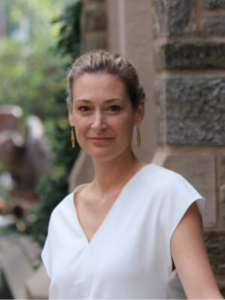 Laura Bingham is Executive Director of the Institute for Law, Innovation & Technology at Temple Law School. She has extensive experience in international human rights litigation, and has led complex investigations and transnational human rights litigation in every major regional system as well as many national courts, including matters before the UN Human Rights Committee, European Court of Human Rights, African Court on Human and Peoples’ Rights, and Kenyan High Court. She also served as senior managing legal officer with the Open Society Justice Initiative, where she established and led a global program on data, technology, and human rights, which covered content moderation and hate speech, equity and non-discrimination, the right to privacy, data governance, and digital transformation of state and private services.
Laura Bingham is Executive Director of the Institute for Law, Innovation & Technology at Temple Law School. She has extensive experience in international human rights litigation, and has led complex investigations and transnational human rights litigation in every major regional system as well as many national courts, including matters before the UN Human Rights Committee, European Court of Human Rights, African Court on Human and Peoples’ Rights, and Kenyan High Court. She also served as senior managing legal officer with the Open Society Justice Initiative, where she established and led a global program on data, technology, and human rights, which covered content moderation and hate speech, equity and non-discrimination, the right to privacy, data governance, and digital transformation of state and private services.
Daniel Bodansky

Daniel Bodansky is Regents Professor of Law at the Arizona State University Sandra Day O’Connor College of Law. He is a leading authority on international environmental law, particularly global climate change law, and worked in the U.S. State Department, first as an attorney-adviser from 1985 to 1989, then as the climate change coordinator from 1999 to 2001. Since 2001, he has been a consultant and senior adviser to the Center for Climate and Energy Solutions. His publications include “The Art and Craft of International Environmental Law,” and “International Climate Change Law,” co-authored with Lavanya Rajamani and Jutta Brunnee.
Christopher J. Borgen

Christopher J. Borgen is Professor of Law and Co-Director of the Center for International and Comparative Law at St. John’s University School of Law where, from 2009 to 2014, he served as Associate Dean for International Studies. His current research focuses on secession and on how “great powers” use of international law as a diplomatic tool in international crises, and he has written widely on the topics of self-determination, secession, the recognition of states, international dispute resolution, and other topics in international law and national security law. Professor Borgen is the co-founder of Opinio Juris, a website devoted to discussion, debate, and reports concerning international law.
Kristen Carpenter
 Kristen Carpenter is the Council Tree Professor of Law and Director of the American Indian Law Program at the University of Colorado Law School. Professor Carpenter was appointed to the United Nations Expert Mechanism on the Rights of Indigenous Peoples as its member from North America from 2017-2021. She currently serves as a Justice of the Shawnee Tribe Supreme Court and co-lead of The Implementation Project, with colleagues at the Native American Rights Fund. She has published widely on American Indian Law, Human Rights, and Indigenous Peoples in International Law.
Kristen Carpenter is the Council Tree Professor of Law and Director of the American Indian Law Program at the University of Colorado Law School. Professor Carpenter was appointed to the United Nations Expert Mechanism on the Rights of Indigenous Peoples as its member from North America from 2017-2021. She currently serves as a Justice of the Shawnee Tribe Supreme Court and co-lead of The Implementation Project, with colleagues at the Native American Rights Fund. She has published widely on American Indian Law, Human Rights, and Indigenous Peoples in International Law.
Jacob Katz Cogan
 Jacob Katz Cogan is Associate Dean of Academic Affairs and Judge Joseph P. Kinneary Professor of Law at the University of Cincinnati College of Law. Immediately prior to joining the College of Law, he served as an attorney-adviser in the Office of the Legal Adviser at the U.S. Department of State, where served as counsel for the United States at the International Court of Justice and the Iran-U.S. Claims Tribunal. His research focuses on the hidden assumptions, informal rules, and constitutive decisions and structures that form the operational international legal system, as well as the history of international law. In addition, he publishes the International Law Reporter, a widely read blog on scholarship, events, and ideas related to international law.
Jacob Katz Cogan is Associate Dean of Academic Affairs and Judge Joseph P. Kinneary Professor of Law at the University of Cincinnati College of Law. Immediately prior to joining the College of Law, he served as an attorney-adviser in the Office of the Legal Adviser at the U.S. Department of State, where served as counsel for the United States at the International Court of Justice and the Iran-U.S. Claims Tribunal. His research focuses on the hidden assumptions, informal rules, and constitutive decisions and structures that form the operational international legal system, as well as the history of international law. In addition, he publishes the International Law Reporter, a widely read blog on scholarship, events, and ideas related to international law.
Amy Cohen
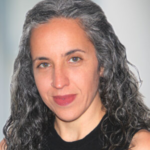 Amy Cohen is the inaugural holder of the Robert J. Reinstein Chair at Temple Law School. Her research focuses on two areas of sociolegal scholarship—informal justice, including among people building alternatives to the criminal legal system, and law and economic development, including the law and political economy of agriculture and food. Before joining Temple, she was the John C. Elam/Vorys Sater Professor of Law at The Ohio State University and Professor of Law at UNSW Sydney. She has also held visiting professorships at Harvard Law School, Osgoode Hall Law School, the University of Turin Faculty of Law, and the West Bengal National University of Juridical Sciences, as well as fellowships from the Radcliffe Institute for Advanced Study at Harvard University, the American Institute of Indian Studies at the University of Chicago, the Fulbright Program, and the Collegio Carlo Alberto.
Amy Cohen is the inaugural holder of the Robert J. Reinstein Chair at Temple Law School. Her research focuses on two areas of sociolegal scholarship—informal justice, including among people building alternatives to the criminal legal system, and law and economic development, including the law and political economy of agriculture and food. Before joining Temple, she was the John C. Elam/Vorys Sater Professor of Law at The Ohio State University and Professor of Law at UNSW Sydney. She has also held visiting professorships at Harvard Law School, Osgoode Hall Law School, the University of Turin Faculty of Law, and the West Bengal National University of Juridical Sciences, as well as fellowships from the Radcliffe Institute for Advanced Study at Harvard University, the American Institute of Indian Studies at the University of Chicago, the Fulbright Program, and the Collegio Carlo Alberto.
Jorge Contesse
 Jorge Contesse is a Professor of Law at Rutgers Law School, where he is founding director of the Rutgers Center for Transnational Law. He writes on international human rights and comparative constitutional law, focusing on the judicialization of international law and on the interaction between domestic constitutional actors and international human rights regimes, in particular, the inter-American human rights system. In addition, he has litigated and acted as expert witness in cases before international bodies, on issues regarding sexual orientation, the use of anti-terrorist laws, freedom of expression, and the rights of indigenous peoples.
Jorge Contesse is a Professor of Law at Rutgers Law School, where he is founding director of the Rutgers Center for Transnational Law. He writes on international human rights and comparative constitutional law, focusing on the judicialization of international law and on the interaction between domestic constitutional actors and international human rights regimes, in particular, the inter-American human rights system. In addition, he has litigated and acted as expert witness in cases before international bodies, on issues regarding sexual orientation, the use of anti-terrorist laws, freedom of expression, and the rights of indigenous peoples.
Peter Danchin
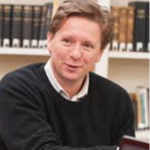 Peter Danchin is Associate Dean for Research and Faculty Development, Jacob A. France Professor of Law, and Co-Director of the International and Comparative Law Program at the University of Maryland Carey School of Law. His areas of interest include international law, human rights, comparative constitutional law and legal theory. His scholarship focuses, in particular, on critical approaches to the right to religious freedom in international legal, political, moral and theological thought. He has served as a Senior Research Fellow in Law at the Center of Theological Inquiry in Princeton and as a Visiting Professor in Law at the University of Cape Town.
Peter Danchin is Associate Dean for Research and Faculty Development, Jacob A. France Professor of Law, and Co-Director of the International and Comparative Law Program at the University of Maryland Carey School of Law. His areas of interest include international law, human rights, comparative constitutional law and legal theory. His scholarship focuses, in particular, on critical approaches to the right to religious freedom in international legal, political, moral and theological thought. He has served as a Senior Research Fellow in Law at the Center of Theological Inquiry in Princeton and as a Visiting Professor in Law at the University of Cape Town.
Margaret deGuzman
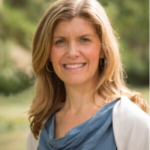 Margaret deGuzman is James E. Beasley Professor of Law and Co-Director of the Institute for International Law and Public Policy at Temple Law School, and a judge of the Residual Mechanism for International Criminal Tribunals. She specializes in criminal law, international criminal law, international humanitarian law, international human rights law, and transitional justice. Her scholarship examines the role of international criminal law in the global legal order, with a particular focus on the work of the International Criminal Court. Before joining the Temple Law faculty, she served as a legal advisor to the Senegal delegation at the Rome Conference on the ICC and as a law clerk in the Office of the Prosecutor of the International Criminal Tribunal for Former Yugoslavia. She was also a Fulbright Scholar in Darou Ndiar, Senegal.
Margaret deGuzman is James E. Beasley Professor of Law and Co-Director of the Institute for International Law and Public Policy at Temple Law School, and a judge of the Residual Mechanism for International Criminal Tribunals. She specializes in criminal law, international criminal law, international humanitarian law, international human rights law, and transitional justice. Her scholarship examines the role of international criminal law in the global legal order, with a particular focus on the work of the International Criminal Court. Before joining the Temple Law faculty, she served as a legal advisor to the Senegal delegation at the Rome Conference on the ICC and as a law clerk in the Office of the Prosecutor of the International Criminal Tribunal for Former Yugoslavia. She was also a Fulbright Scholar in Darou Ndiar, Senegal.
Mark A. Drumbl

Mark A. Drumbl is the Class of 1975 Alumni Professor at Washington and Lee University, School of Law, where he also serves as Director of the Transnational Law Institute. His scholarly interests include public international law, transnational legal process, international criminal law, and transitional justice, and his publications include Reimagining Child Soldiers in International Law and Policy (2012) and Atrocity, Punishment, and International Law (2007). He held visiting appointments with a number of law faculties, including Oxford, Paris II (Pantheon-Assas), Melbourne, Sydney, VU Amsterdam, Masaryk, and Ottawa.
Caroline Elkins
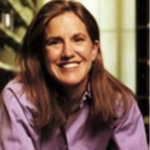 Caroline Elkins is a Professor of History and African and African American Studies at Harvard University. Her research interests include colonial violence and post-conflict reconciliation in Africa, and violence and the decline of the British Empire. She is currently working on two projects: one examining the effects of violence and amnesia on local communities and nation-building in post-independent Kenya; the other analyzing British counter-insurgency operations after the Second World War, with case studies including Palestine, Malaya, Kenya, Cyprus, and Nyasaland. Her first book, Imperial Reckoning: The Untold Story of Britain’s Gulag in Kenya, was awarded the 2006 Pulitzer Prize for General Non-Fiction, was selected as one of the Economist‘s best history books for 2005, was a New York Times editor’s choice, and was a finalist for the Lionel Gelber Award. Her writings have also appeared in The New York Times Book Review, The Atlantic, and The New Republic.
Caroline Elkins is a Professor of History and African and African American Studies at Harvard University. Her research interests include colonial violence and post-conflict reconciliation in Africa, and violence and the decline of the British Empire. She is currently working on two projects: one examining the effects of violence and amnesia on local communities and nation-building in post-independent Kenya; the other analyzing British counter-insurgency operations after the Second World War, with case studies including Palestine, Malaya, Kenya, Cyprus, and Nyasaland. Her first book, Imperial Reckoning: The Untold Story of Britain’s Gulag in Kenya, was awarded the 2006 Pulitzer Prize for General Non-Fiction, was selected as one of the Economist‘s best history books for 2005, was a New York Times editor’s choice, and was a finalist for the Lionel Gelber Award. Her writings have also appeared in The New York Times Book Review, The Atlantic, and The New Republic.
Jean Galbraith
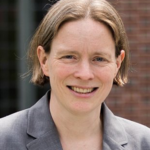 Jean Galbraith is a Professor of Law at the University of Pennsylvania Cary Law School, where she also serves as Co-Director of the Appellate Advocacy Clinic. She teaches broadly in public international law and U.S. foreign relations law, with particular focus on the structure of international legal institutions, especially treaty regimes, and the connections between these institutions and U.S. domestic law. She has previously served as an associate legal officer for Judge Theodor Meron at the International Criminal Tribunal for the former Yugoslavia, and clerked for Judge David S. Tatel of the U.S. Court of Appeals for the D.C. Circuit and for Justice John Paul Stevens at the Supreme Court of the United States.
Jean Galbraith is a Professor of Law at the University of Pennsylvania Cary Law School, where she also serves as Co-Director of the Appellate Advocacy Clinic. She teaches broadly in public international law and U.S. foreign relations law, with particular focus on the structure of international legal institutions, especially treaty regimes, and the connections between these institutions and U.S. domestic law. She has previously served as an associate legal officer for Judge Theodor Meron at the International Criminal Tribunal for the former Yugoslavia, and clerked for Judge David S. Tatel of the U.S. Court of Appeals for the D.C. Circuit and for Justice John Paul Stevens at the Supreme Court of the United States.
Alessandra Gianelli
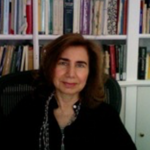 Alessandra Gianelli is a Professore ordinario, Dipartimento di studi giurdici ed economici nell’Università di Roma (La Sapienza), and previously was a Full Professor of International Law at the University of Teramo. She has published widely across many areas of international law, including the role of custom and treaties, the interplay of international and domestic legal orders, and legal theory, specifically the role of positivism. She received her Ph.D. from the University of Rome, and LL.M. degrees from the European University Institute and Yale Law School.
Alessandra Gianelli is a Professore ordinario, Dipartimento di studi giurdici ed economici nell’Università di Roma (La Sapienza), and previously was a Full Professor of International Law at the University of Teramo. She has published widely across many areas of international law, including the role of custom and treaties, the interplay of international and domestic legal orders, and legal theory, specifically the role of positivism. She received her Ph.D. from the University of Rome, and LL.M. degrees from the European University Institute and Yale Law School.
Craig Green
 Craig Green teaches and writes in the fields of Administrative Law, American Legal History, Constitutional Law, and Federal Courts. His recent work addresses territory, statehood, and nation-building and other publications have explored wartime detention, federal common law, judicial activism, precedential interpretation, constitutional history, customary international law, and the significance of iconic cases like Erie v. Tompkins in legal discourse. He received his Ph.D. from Princeton University’s History Department in 2018.
Craig Green teaches and writes in the fields of Administrative Law, American Legal History, Constitutional Law, and Federal Courts. His recent work addresses territory, statehood, and nation-building and other publications have explored wartime detention, federal common law, judicial activism, precedential interpretation, constitutional history, customary international law, and the significance of iconic cases like Erie v. Tompkins in legal discourse. He received his Ph.D. from Princeton University’s History Department in 2018.
Morton Halperin
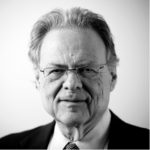 Morton Halperin held many senior positions in the U.S. government, including Director of the Policy Planning Staff at the State Department, Special Assistant to the President and Senior Director for Democracy at the National Security Council, and Special Assistant to the Secretary of Defense. Following his government service, he held leadership positions at the Open Society Foundations, the Center for American Progress, the Council on Foreign Relations, the Carnegie Endowment for International Peace, and the ACLU. He has taught at Harvard, Columbia and Yale, and is the author of numerous books and articles on a range of foreign policy issues, as well as the relationship between national security and civil liberties.
Morton Halperin held many senior positions in the U.S. government, including Director of the Policy Planning Staff at the State Department, Special Assistant to the President and Senior Director for Democracy at the National Security Council, and Special Assistant to the Secretary of Defense. Following his government service, he held leadership positions at the Open Society Foundations, the Center for American Progress, the Council on Foreign Relations, the Carnegie Endowment for International Peace, and the ACLU. He has taught at Harvard, Columbia and Yale, and is the author of numerous books and articles on a range of foreign policy issues, as well as the relationship between national security and civil liberties.
J. Benton (Ben) Heath
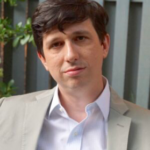
Benton (Ben) Heath is Assistant Professor of Law at Temple Law School. His primary research interests include international trade, investment law, dispute resolution, global health, administrative law, public international law, and the national security dimensions of trade and investment. Previously, he practiced international law and arbitration at the U.S. State Department, and in private practice, and has represented governments and state-owned enterprises before the International Court of Justice, the Iran-United States Claims Tribunal, and other international arbitral tribunals.
Duncan Hollis
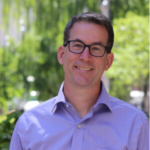 Duncan Hollis is Laura H. Carnell Professor of Law at Temple Law School and co-faculty director of Temple’s Institute for Law, Innovation & Technology (iLIT). His scholarship engages with issues of international law, interpretation, and cybersecurity, with a particular emphasis on treaties, norms, and other forms of international regulation. He is currently a non-resident Scholar at the Carnegie Endowment for International Peace, an appointed member of the U.S. Department of State’s Advisory Committee on International Law, and co-convenor of the Oxford Process on International Law Protections in Cyberspace, and previously served as a member of the OAS’s Inter-American Juridical Committee.
Duncan Hollis is Laura H. Carnell Professor of Law at Temple Law School and co-faculty director of Temple’s Institute for Law, Innovation & Technology (iLIT). His scholarship engages with issues of international law, interpretation, and cybersecurity, with a particular emphasis on treaties, norms, and other forms of international regulation. He is currently a non-resident Scholar at the Carnegie Endowment for International Peace, an appointed member of the U.S. Department of State’s Advisory Committee on International Law, and co-convenor of the Oxford Process on International Law Protections in Cyberspace, and previously served as a member of the OAS’s Inter-American Juridical Committee.
Rachel López
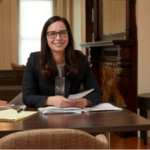 Rachel López is Associate Professor of Law and Director of the Andy and Gwen Stern Community Lawyering Clinic at the Thomas R. Kline School of Law at Drexel University. Her scholarship primarily focuses on state responsibility for mass abuse, transitional justice, and the carceral state. A recent article, Redeeming Justice (co-authored with Terrell Carter and Kempis Songster), won the 2022 Law and Society Association (LSA) Article Prize. She previously worked at the Open Society Justice Initiative, the Inter-American Commission on Human Rights, and the International Criminal Tribunal for Rwanda.
Rachel López is Associate Professor of Law and Director of the Andy and Gwen Stern Community Lawyering Clinic at the Thomas R. Kline School of Law at Drexel University. Her scholarship primarily focuses on state responsibility for mass abuse, transitional justice, and the carceral state. A recent article, Redeeming Justice (co-authored with Terrell Carter and Kempis Songster), won the 2022 Law and Society Association (LSA) Article Prize. She previously worked at the Open Society Justice Initiative, the Inter-American Commission on Human Rights, and the International Criminal Tribunal for Rwanda.
Jonathan H. Marks
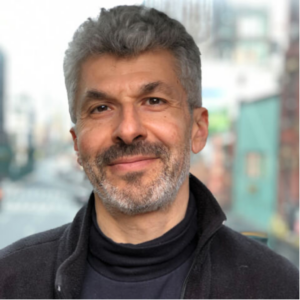 Jonathan H. Marks is Professor of Bioethics, Humanities, Law, and Philosophy at the Pennsylvania State University, where he serves as Director of the Bioethics Program. He is also affiliate faculty with the Rock Ethics Institute, and Penn State’s Schools of Law, Public Policy, and International Affairs. Marks has held research fellowships at Harvard, Johns Hopkins, and Georgetown Universities; and he has taught law at Oxford (Worcester College), King’s College London, UNSW (Sydney), UNC Law, and Princeton School of Public and International Affairs. Professor Marks has participated as an expert on ethics and human rights in meetings of the World Health Organization, the National Academies, and the Royal Society in London. He served as counsel for Human Rights Watch with Professor Sands in the Pinochet case. Marks has written extensively about the legal and ethical implications of health professionals’ participation in interrogation and torture at Guantanamo Bay and the CIA’s global network of black sites. His writing has appeared in the New York Times, The Times (London), LA Times, and The Nation, as well as a variety of journals of international law, human rights, ethics, and public health.
Jonathan H. Marks is Professor of Bioethics, Humanities, Law, and Philosophy at the Pennsylvania State University, where he serves as Director of the Bioethics Program. He is also affiliate faculty with the Rock Ethics Institute, and Penn State’s Schools of Law, Public Policy, and International Affairs. Marks has held research fellowships at Harvard, Johns Hopkins, and Georgetown Universities; and he has taught law at Oxford (Worcester College), King’s College London, UNSW (Sydney), UNC Law, and Princeton School of Public and International Affairs. Professor Marks has participated as an expert on ethics and human rights in meetings of the World Health Organization, the National Academies, and the Royal Society in London. He served as counsel for Human Rights Watch with Professor Sands in the Pinochet case. Marks has written extensively about the legal and ethical implications of health professionals’ participation in interrogation and torture at Guantanamo Bay and the CIA’s global network of black sites. His writing has appeared in the New York Times, The Times (London), LA Times, and The Nation, as well as a variety of journals of international law, human rights, ethics, and public health.
Julia Morris
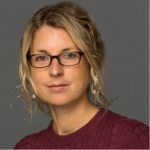
Julia Morris is Assistant Professor of International Studies at the University of North Carolina Wilmington. She is a political anthropologist and migration studies scholar whose research focuses on the commodification of human mobility. She has conducted fieldwork in the Republic of Nauru, Australia, Geneva, Fiji, Jordan, Lebanon, and the Texas-Mexico borderlands. She recently published Asylum and Extraction in the Republic of Nauru (2023).
Mae Nguyen
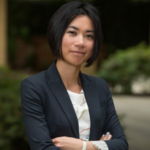
Mae Nguyen is an Assistant Professor of Law at Temple University Beasley School of Law and an affiliated scholar at the U.S.-Asia Law Institute, New York University School of Law. Her research and teaching expertise are in the areas of international law, transnational law, business law, and contracts. She has written on global value chains, authoritarian international law, and the various strategies that small states pursue in international affairs. She was recently selected as a 2022-23 Wilson China Fellow at the Wilson Center.
Elizabeth Chinenyenwa Nwarueze
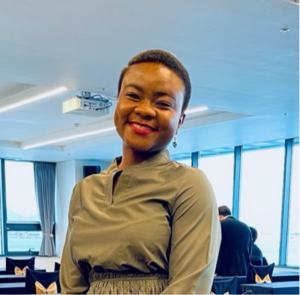 Elizabeth Chinenyenwa Nwarueze is a lawyer and 2021 Rhodes Scholar. She holds a Bachelor of Civil Law Degree from University of Oxford, a Public Policy Certificate from the Moller Institute, University of Cambridge, a Bachelor of Laws from University of Ibadan and a Diploma (Summa cum Laude) from the Yeosu Academy of the Law of the Sea. She attended the 2022 Summer Courses of The Hague Academy of International Law and recently participated in the negotiations which resulted in the Agreement on Marine Biodiversity in Areas Beyond National Jurisdiction (BBNJ Treaty). Her current research focuses on maritime boundaries litigation and ocean governance and she contributes international law perspectives to security challenges in the Gulf of Guinea through publications on human rights at sea and enforcement against piracy.
Elizabeth Chinenyenwa Nwarueze is a lawyer and 2021 Rhodes Scholar. She holds a Bachelor of Civil Law Degree from University of Oxford, a Public Policy Certificate from the Moller Institute, University of Cambridge, a Bachelor of Laws from University of Ibadan and a Diploma (Summa cum Laude) from the Yeosu Academy of the Law of the Sea. She attended the 2022 Summer Courses of The Hague Academy of International Law and recently participated in the negotiations which resulted in the Agreement on Marine Biodiversity in Areas Beyond National Jurisdiction (BBNJ Treaty). Her current research focuses on maritime boundaries litigation and ocean governance and she contributes international law perspectives to security challenges in the Gulf of Guinea through publications on human rights at sea and enforcement against piracy.
Obiora Okafor
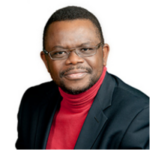
Obiora Okafor is the Edward B. Burling Chair in International Law and Institutions at the Johns Hopkins University School of Advanced International Studies (SAIS). He has published extensively in the fields of international law, including on international human rights law and immigration/refugee law, and third world approaches to international law. He has served, since August 2017, as the UN Independent Expert on Human Rights and International Solidarity and as a former Chair of the United Nations Human Rights Council Advisory Committee (a Geneva-based committee of experts elected by the Human Rights Council to serve as its think tank and principal subsidiary organ). He has also served as an expert panelist for the United Nations Security Council’s Counter-Terrorism Committee and United Nations Working Group on People of African Descent.
Diane Orentlicher
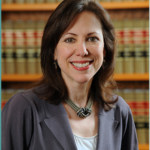
Diane Orentlicher is Professor of International Law at American University Washington College of Law. She writes widely on issues of transitional justice, international criminal law, human rights, war crimes tribunals, and other areas of public international law. Professor Orentlicher has served in various public positions, including as the Deputy for War Crimes Issues in the U.S. Department of State (2009-2011); United Nations Independent Expert on Combating Impunity (on appointment by the UN Secretary-General) and Special Advisor to the High Commissioner on National Minorities of the Organization for Security and Co-operation in Europe (on secondment from the U.S. Department of State).
Ayodeji Perrin
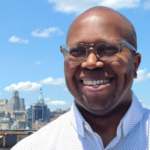 Ayodeji Perrin is a Sharswood Fellow at the University of Pennsylvania Carey School of Law. His research focuses on international law, comparative constitutional law, human rights, and social movement legal mobilization. Current research focuses on the role of transnational advocacy networks, transnational judicial dialogue, and comparative constitutional law in decriminalization of homosexual sex in Africa and the English-speaking Caribbean.
Ayodeji Perrin is a Sharswood Fellow at the University of Pennsylvania Carey School of Law. His research focuses on international law, comparative constitutional law, human rights, and social movement legal mobilization. Current research focuses on the role of transnational advocacy networks, transnational judicial dialogue, and comparative constitutional law in decriminalization of homosexual sex in Africa and the English-speaking Caribbean.
Mark Pollack

Mark Pollack is Professor and Chair of the Political Science Department, and Jean Monnet Chair, at Temple University. His research focuses on international institutions, international law, and the politics of the European Union, among other subjects. Recent work has examined the politics of international law, comparative international judicial practices across international tribunals, the United States’ ambivalent relationship to international law, as well as interdisciplinary approaches to international law and international legal theory.
Jaya Ramji-Nogales
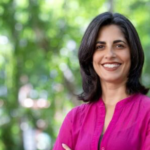
Jaya Ramji-Nogales is the I. Herman Stern Research Professor and Associate Dean for Research at Temple Law School. Her research areas include asylum and refugee law, global migration law, and empirical assessment of asylum adjudication. Recent work focuses on focuses on forced migration as well as the intersection of immigration and international human rights law. Her most recent works explore the role of international migration law in constructing migration emergencies and critique human rights law as insufficiently attentive to the interests of undocumented migrants. She has also written on the situation of forced migrants under international criminal law and international humanitarian law, and published several quantitative and qualitative studies of the U.S. asylum system.
Sebastian von Massow

Sebastian von Massow is a Researcher at the European University Institute. His current research explores whether the arguments raised in the litigation of Chagos and Western Sahara at the national, European, and international levels have contributed to the decolonisation of international law. He has recently conducted interviews with various lawyers in London involved in these litigations, observed the Mauritius/Maldives maritime boundary dispute at the ITLOS in Hamburg, and interacted with members of the Chagossian Community in Crawley.
